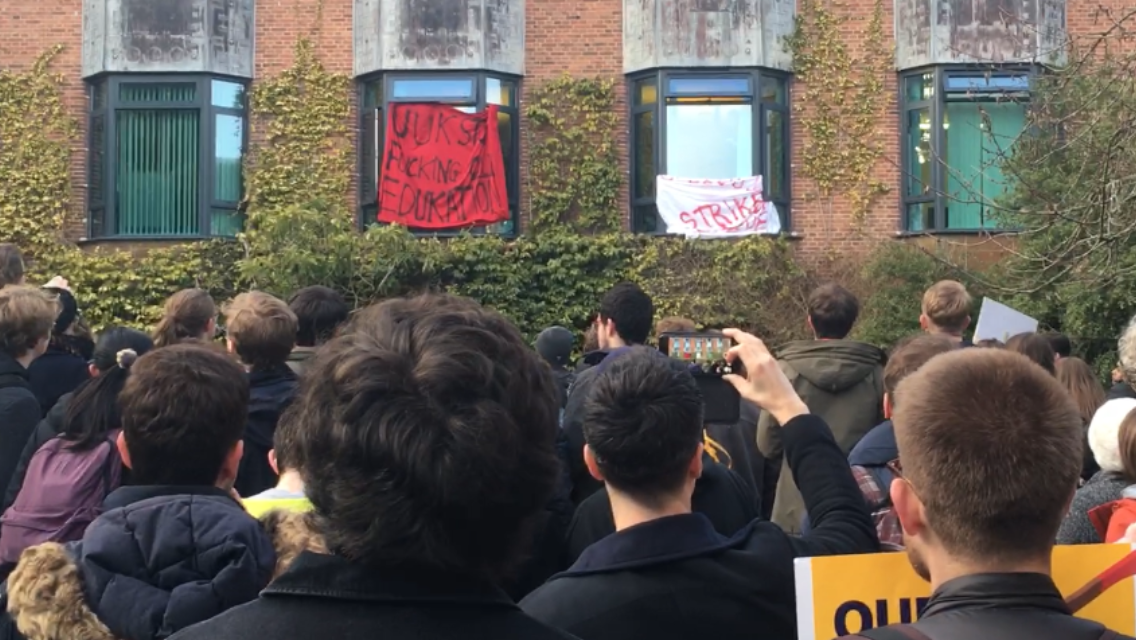
UCU academics in Exeter and across the UK have now been striking for over three weeks. This is due to proposed changes to the USS pension scheme made by the UUK (Universities UK) to move from pensions based on defined benefit to defined contribution. The UUK say the status quo is financially unsustainable due to a deficit over £6bn. The UCU argue it’s in fact in £8.3bn of surplus and dismiss their ‘conservative’ estimates, claiming they will be £10,000 a year worse of in retirement if their pensions are left to be determined by the stock market. The range is so great as these are all projected estimates for the future.
Some students have called for missed lecture and tutorial time to be refunded. Universities minister, Sam Gyimah is encouraging students to demand compensation.
A deal had been agreed on 12 March between national UCU and UUK negotiators but was resoundingly rejected by the UCU representatives. Many local UCU branches were outraged by a deal that proposed temporary pension arrangements to be introduced, a revaluation of the UUK’s projected deficit and a plan to re-open talks for a new scheme to be introduced from 2020. The Exeter UCU branch was one of those.
In Exeter, a conference room and lobby in Northcote House have been occupied in support of striking lecturers who first went on strike on 22 February and was combined by a sit down protest in the forum on 14 March. They are demanding Steve Smith clarifies his position. Some vice-chancellors have come out against the proposals, supporting a softer alternative. Steve Smith has not.
The Witness has reached out to key players involved in and affected by the USS strike including Exeter’s MP Ben Bradshaw. Read below for what they said to us.
Vice Chancellor Steve Smith’s position
In an email to students on 21 February, Steve Smith outlined why he supports the proposed changes:
“The scheme’s current funding arrangements cannot support the cost of funding future pension benefits to members. Despite changes being made in 2011 and 2016, the scheme deficit has increased to approximately £7.5 billion”.
Under these proposals, the University will continue to pay its current contribution rate of 18% of salaries. Members would continue to contribute 8% or would have the option to choose a lower rate of 4% of their salaries. Any changes to pension benefits would only affect those benefits earned after the implementation date, likely to be April 2019, and benefits already built up would be protected by law and cannot be changed retrospectively”.
In an email on 13 March, he came out in favour of the now void deal reached between the UCU and UUK through ACAS:
“We need to look at the details but our first impression is that it is an agreement that we are willing to support”.
What striking lecturers say
Dr John Heathershaw, Associate Professor of International Relations:
Why he’s striking:
“The objective of the strike is to protect as much of the defined benefit scheme as possible… I think the basic problem is that of shifting all the risk from the employer to the employee, whereas it should be shared and a basic income for life guaranteed for the elderly”.
On the scheme’s deficit:
“The deficit is long-standing and was addressed by a seventeen-year recovery scheme which was agreed and began less than two years ago. Independent actuarial advice and academic analysis suggests this is beginning to work. This should be allowed time to take effect not thrown out. What is the point in signing up to a recovery plan if it can be thrown out so prematurely?”
“The pension’s regulator is highly conservative in its financial assessments and appears to accept some problematic assumptions which treat universities like any other private sector actor, like BHS and Carillion which recently went bust. But 800-year-old universities are public institutions and will not go broke like that”.
On Steve Smith’s position:
“The position taken by the VC is unfortunate… Many VCs have come out against the proposals because they have seen the evidence and recognise the duty of care to their employees. These VCs value their human capital above physical capital and the incentive to generate maximum surplus. Others, concerned about the amount of debt they have taken on and the incessant market demand to expand, have decided that it is in their interest to take the opportunity to remove pension liabilities from their balance sheet”.
Students as consumers:
“As students are personally paying a large amount of money for the service of education they have the right to expect it to be delivered and consumer rights to refunds. We lose a day pay for every day of strike. It is not clear what universities will do with the money they save due to the strike. Students-as-consumers is a fact but students should also maintain other relations which are not driven by the market… there are wider issues of marketisation here – including fees themselves – that need addressing and require this critical engagement by students”.
A role for government?
“The government relinquished its seat on the USS board following legal changes by the Coalition Government in 2011. It thereby sought to absolve itself of responsibility to intervene in the public interest in the cases – such as this one. Where employers seek to use conservative actuarial estimations as a means to unnecessarily reduce benefits and attack the right to a fair pension, government has a public duty to intervene”.
Jihad Mashamoun, MPhil/PhD Candidate in Arab and Islamic Studies & Teaching Assistant:
On marketisation:
“It depends how you manipulate statistics to fit your own answer. The UCU has its own statistics and the university has its own conservative statistics… I personally disagree with the whole idea of the pension being in the stock market. It’s a horrible way to place people’s hard earned money, if anything it makes it more risky than ever… it shouldn’t be happening… the university is taking away it’s role of responsibility towards its lecturers and teaching staff and saying it’s the market’s fault. You cannot rely on the market for justice”.
On student pressure:
“I think students should be fully refunded by the university because it is the university that could have stopped the strike action a long time ago… you enter negotiations, both sides try to find a middle ground resolving the issue. Apparently, the university didn’t want to enter negotiations so that’s what happened. The only way to teach them a lesson is to get them to repay the funds that students pay them. It’s a right but it’s also a tactic to pressure the university to understand that the students can also have an impact on policy”.
What students think
Jack Morewood, second year Maths:
“I don’t support this strike as the ambition is clearly to use student outrage as a result of damage to our degrees and experience on campus to force UUK to change a pension scheme. Not only do I think this is inappropriate, but futile as UUK’s hands are essentially tied: ageing populations and market conditions have meant a pension scheme today looks very different to a pension scheme thirty years ago. The best solution is that the pension changes go ahead and lecturers receive a fair pay rise to make up for the uncertainty of potential losses if USS fails to perform”.
“There seems to be a fear of marketisation in higher education but in this context, we should feel really empowered. Whether we like it or not, students are consumers now and expect certain rights: many at Exeter will have no lectures for 14 days [now longer] and have paid £9,250 for the privilege so absolutely have a right to demand compensation”.
Olly Haynes, second year French & Politics:
“I support the strikes: it’s important to ensure academics can protect their hard earned working rights. They have already foregone higher salaries for the invaluable work that they do in order to have security in retirement, and now even that is being taken away by the UUK… I’m not impressed by Steve Smith’s position – he earns over £400,000 yet he refuses to back basic employment rights for his staff. It smacks of greed and hypocrisy.”
“Higher education has been marketised which is regretful but now that it has been and we are treated like consumers, we should be treated like consumers in all respects. The supply side of the transaction shouldn’t be allowed to dictate everything”.
Ben Hooper, second year Maths:
“Good pensions are part of the reason people are able to consider a life-long career in academia…disingenuous claims by UUK of a deficit in the pension scheme, which is only found in models which assume every university in the scheme goes out of business together (in fact, the pension scheme currently receives more money than it pays out), and the case in support of the strikes is incontrovertible”.
“It’s completely understandable that students want compensation from universities which have jeopardised part of their degree with these unacceptable proposals, and if students contact the Vice-Chancellor calling for refunds then it will put a lot of pressure onto university management to swiftly end the dispute. Personally, I would rather any compensation due be used to grow the student hardship fund, however if students are more comfortable campaigning for personal compensation then I would encourage them to do so”.
Ben Bradshaw’s reaction
He thinks a more equitable approach is necessary:
“I’m not an actuary or pensions’ expert, so am not in a position to make a judgement about this, but I note several leading universities disagree with UUK’s official position, which would indicate they either believe the projected deficit is not as bad as UUK claims or that there are alternative and more equitable ways of addressing it”.
Is a wider debate necessary on marketisation of higher education? “Definitely, yes” was the reply.
Students have the right to be compensated:
“Yes. Students pay high fees and incur significant debts by studying for a degree. They should receive compensation for loss of educational provision they have paid for”.
With the deal now rejected, strikes are set to continue and a further fourteen days of industrial action are planned for the exam period. Whatever your view on the strikes it has certainly deepened mistrust between university management and their lecturers. As the impact on students worsens, anger at lost teaching time will likely grow.
One thing that should be universally agreed is that something is awry in the university sector. A broader debate around the direction that higher eduction is moving in would be sensible.
Kicking the can into the long grass would help no one.
Steve Smith’s office were contacted for further comment, acknowledged our request – but then failed to provide a response.


Average Rating